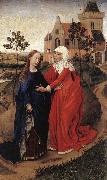
Öl auf dem Segeltuch,das echte Aroma von alten Meistern
|
WEYDEN, Rogier van der
|
|||
|
|
|||

|
|||
Visitation
Gemälde IDENTIFIZIERUNG:: 63876 new21/WEYDEN, Rogier van der-594294.jpg 1445 Oil on oak panel, 57 x 36 cm Museum der Bildenden K?nste, Leipzig This small Visitation, probably intended as a single panel, is related to the Miraflores Altarpiece, not in subject but in style. Comparatively speaking, it is a narrative picture, showing a definite event in its appropriate surroundings. Shortly after the Annunciation, Mary visits her cousin Elisabeth, who despite her advanced age has miraculously become pregnant, and has been carrying the future John the Baptist for six months. The picture illustrates the circumstances of the meeting described in St. Luke's Gospel much more clearly than many other earlier depictions. For example, the landscape divided up by paths behind the Virgin Mary, from which she seems to be approaching small figures of people riding and walking indicate that it is passable - show that she has traveled a long way to visit her cousin. Elisabeth lives in hilly country, represented by the hill with the complex of fortress-like buildings outside which her husband Zacharias is playing with a dog. The open courtyard gateway, and even more so the path dynamically winding downward, show that the pregnant older woman has hurried respectfully to meet the young girl as Mary takes the last few steps. Each of them acknowledges the miracle of pregnancy and is laying a hand on the other's belly, while Elisabeth's outstretched arm and pale hand, shown against Mary's dark blue dress, leave us in no doubt which is the more important child. The gestures, at once tender and eloquent, are typical of Rogier's expressive style. The picture is also closely related to the version of the same subject on the right wing of the Annunciation Triptych (Galleria Sabauda, Turin) which is of the same width but considerably taller and thus makes a much narrower composition. The smaller version therefore appears less dramatic by comparison; Elisabeth's house does not tower over her so much. It is possible that an older design by Rogier was the model for both painting. These hands and facial types, the figures, and such features as the modeling of the forms resemble those of the Miraflores Altarpiece. Dendrochronology provides a useful lead to the date of the Visitation, for the wooden panel used comes from the same piece of timber as a part of the panels of the picture known as the Abegg Triptych (Riggisberg near Berne), which was painted in Rogier's workshop and can be dated to around 1445.Artist:WEYDEN, Rogier van der Title: Visitation Painted in 1401-1450 , Flemish - - painting : religious Siehe Galerie in Schweden |
|||
|
|
|||
|
|
|||
| Netherlandish Northern Renaissance Painter, ca.1400-1464 | |||
| 1445 Oil on oak panel, 57 x 36 cm Museum der Bildenden K?nste, Leipzig This small Visitation, probably intended as a single panel, is related to the Miraflores Altarpiece, not in subject but in style. Comparatively speaking, it is a narrative picture, showing a definite event in its appropriate surroundings. Shortly after the Annunciation, Mary visits her cousin Elisabeth, who despite her advanced age has miraculously become pregnant, and has been carrying the future John the Baptist for six months. The picture illustrates the circumstances of the meeting described in St. Luke's Gospel much more clearly than many other earlier depictions. For example, the landscape divided up by paths behind the Virgin Mary, from which she seems to be approaching small figures of people riding and walking indicate that it is passable - show that she has traveled a long way to visit her cousin. Elisabeth lives in hilly country, represented by the hill with the complex of fortress-like buildings outside which her husband Zacharias is playing with a dog. The open courtyard gateway, and even more so the path dynamically winding downward, show that the pregnant older woman has hurried respectfully to meet the young girl as Mary takes the last few steps. Each of them acknowledges the miracle of pregnancy and is laying a hand on the other's belly, while Elisabeth's outstretched arm and pale hand, shown against Mary's dark blue dress, leave us in no doubt which is the more important child. The gestures, at once tender and eloquent, are typical of Rogier's expressive style. The picture is also closely related to the version of the same subject on the right wing of the Annunciation Triptych (Galleria Sabauda, Turin) which is of the same width but considerably taller and thus makes a much narrower composition. The smaller version therefore appears less dramatic by comparison; Elisabeth's house does not tower over her so much. It is possible that an older design by Rogier was the model for both painting. These hands and facial types, the figures, and such features as the modeling of the forms resemble those of the Miraflores Altarpiece. Dendrochronology provides a useful lead to the date of the Visitation, for the wooden panel used comes from the same piece of timber as a part of the panels of the picture known as the Abegg Triptych (Riggisberg near Berne), which was painted in Rogier's workshop and can be dated to around 1445.Artist:WEYDEN, Rogier van der Title: Visitation Painted in 1401-1450 , Flemish - - painting : religious | |||
|
|
|||







